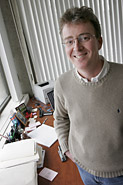Grant for dean of science
The search for a new dean for the Faculty of Science is over. When current dean Alan Shaver steps down at the beginning of June 2005, physics professor Martin Grant will take his place.

New dean of Science Martin Grant
Owen Egan
"Martin was the unanimous choice of the committee," says Provost Luc Vinet. "The faculty has developed extremely well over the last decade under Alan Shaver, and it's poised to reach higher levels.
"He's an outstanding scholar," Vinet continues, "And he has a great vision of where the science faculty should go. He's systematic, understands the benchmarking process and the bootstrapping that will ensue."
Grant was hired to McGill in 1986, just happy "to get a job in a great department in a great school," he says. Made a James McGill Professor in 2002, Grant was also elected a Fellow of the Royal Society of Canada this past year.
Grant was associate dean (research) of the faculty for a year before becoming chair of the Department of Physics in June 2002. He's familiar with administrative matters and many members of McGill from his stints on university and departmental committees (including for libraries, faculty hiring and, most recently, as chair of the Dining at McGill Advisory Committee).
Vinet says that Grant "relates well to students and colleagues. There's a democratic feel to him and he knows how to rally people."
Grant says he's used to taking on these kinds of tasks from being the older brother in a large family. He grew up in Charlottetown, P.E.I., a city small enough that you know everyone up to the mayor. Happily, Grant finds a similar community feeling in his adopted province. "In Quebec there are a lot of incentives to work together, for researchers to collaborate.
"We have a reputation as a research-intensive school, but there's a real collegial atmosphere," he says. Recruits from the United States particularly note this isn't a combative environment, he adds, "and just living in Montreal, you'll be more relaxed."
This gives McGill a competitive advantage on recruiting good faculty. Thanks to McGill's aggressive academic renewal plan, the faculty's been hiring 20 to 25 people a year. New hires foster new programs and new ideas, he says. "They'll be what's driving the university for the next 20 to 25 years. They'll be pulling together to make this a stronger place."
Grant says that a lot of his deanship duties "will be following what Alan Shaver did, because he's a great dean." Shaver, along with Grant and a team of other faculty members, spent a year working on a planning document for the faculty.
Programs will be introduced, such as earth systems science ("the science of the environment," Grant explains) and space science.
He also plans to develop a "greater involvement of undergraduates in research. The undergraduates are so good here, so interested in what their professors are doing."
Public outreach will be part of his mandate, both to alumni as part of fundraising, and to the public. Like many in the field, Grant is nearly beside himself when confronted with sloppy and fanciful notions of science in the public realm. "McGill is the big story for science in Montreal," he says, and he wants to make sure others know it.
Grant hopes to see money come in for graduate student funding and toward "chairs in various fields, targeted to sexy disciplines that are appealing to academics and to people outside." As well, equipment will require attention. "As hiring slows down, we'll have to look at renovating undergraduate labs."
It's an exciting time at McGill, and as chance would have it, there are quite a few deanships slated for a change. Grant says, "It's important that the university be run by academics involved in research and scholarly work, than by professional administrators." The best way to galvanize a faculty as an administrator is to be well-versed in all levels of its affairs, he believes.
Grant's interdisciplinary re-search examines the boundary between condensed-matter physics and materials science, such as crystal growth, flame behaviour and fluid decomposition. The span of physics, chemistry, applied mathematics and computer modelling hints at his wide-ranging interests. He also plays guitar for the physics department's Red Shift Blues Band (the name's a pun on and astrophysical phenomenon) and has taught a course on acoustics to music students. "Musical people are fun to deal with. They're like scientists — very technical," he said.
Grant's personal webpage includes sundries like Asian recipes and how to build a guitar pedal to max that fuzzy Hendrix sound. Eclectic? Maybe, but "it's part of the culture of academia," Grant says. "It's the free software model. Scientists post papers, share ideas. We don't make money for our papers, we want others to think about our ideas. It's the culture of academia."
